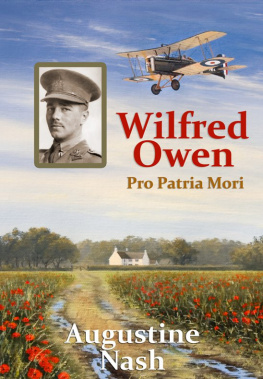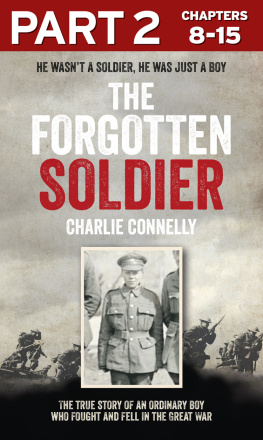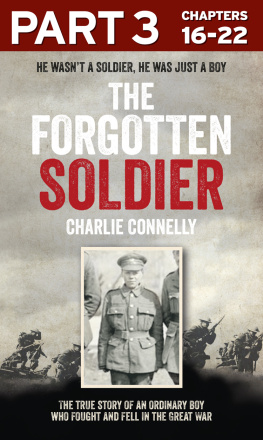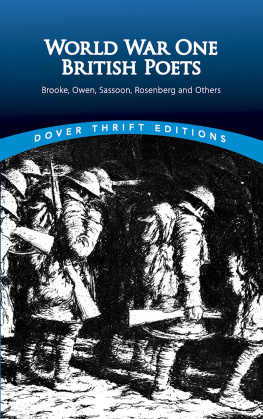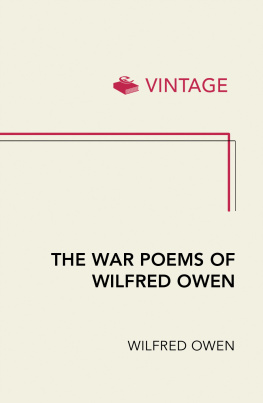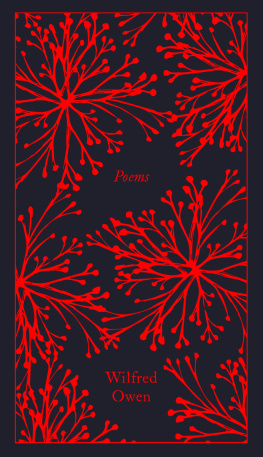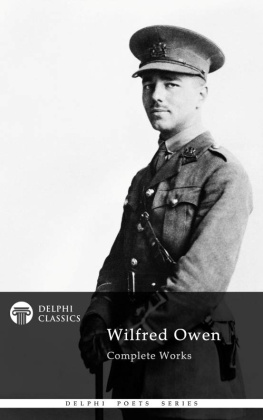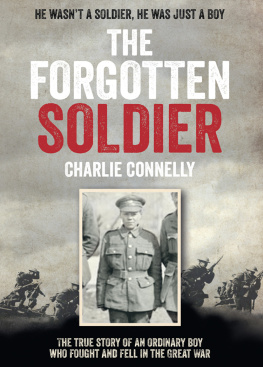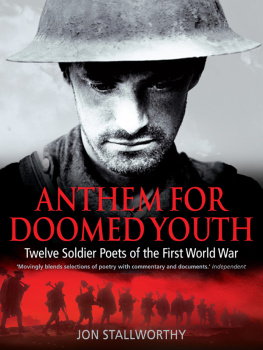Augustine Nash - Wilfred Owen: Pro Patria Mori
Here you can read online Augustine Nash - Wilfred Owen: Pro Patria Mori full text of the book (entire story) in english for free. Download pdf and epub, get meaning, cover and reviews about this ebook. year: 2013, publisher: eBookPartnership.com, genre: Non-fiction. Description of the work, (preface) as well as reviews are available. Best literature library LitArk.com created for fans of good reading and offers a wide selection of genres:
Romance novel
Science fiction
Adventure
Detective
Science
History
Home and family
Prose
Art
Politics
Computer
Non-fiction
Religion
Business
Children
Humor
Choose a favorite category and find really read worthwhile books. Enjoy immersion in the world of imagination, feel the emotions of the characters or learn something new for yourself, make an fascinating discovery.
- Book:Wilfred Owen: Pro Patria Mori
- Author:
- Publisher:eBookPartnership.com
- Genre:
- Year:2013
- Rating:4 / 5
- Favourites:Add to favourites
- Your mark:
- 80
- 1
- 2
- 3
- 4
- 5
Wilfred Owen: Pro Patria Mori: summary, description and annotation
We offer to read an annotation, description, summary or preface (depends on what the author of the book "Wilfred Owen: Pro Patria Mori" wrote himself). If you haven't found the necessary information about the book — write in the comments, we will try to find it.
Wilfred Owen: Pro Patria Mori — read online for free the complete book (whole text) full work
Below is the text of the book, divided by pages. System saving the place of the last page read, allows you to conveniently read the book "Wilfred Owen: Pro Patria Mori" online for free, without having to search again every time where you left off. Put a bookmark, and you can go to the page where you finished reading at any time.
Font size:
Interval:
Bookmark:


Written by Wilfred Owen.
Bent double, like old beggars under sacks,
Knock-kneed, coughing like hags, we cursed through sludge,
Till on the haunting flares we turned our backs
And towards our distant rest began to trudge.
Men marched asleep. Many had lost their boots
But limped on, blood-shod. All went lame; all blind;
Drunk with fatigue; deaf even to the hoots
Of gas-shells dropping softly behind.
Gas! GAS! Quick boys!-An ecstasy of fumbling
Filling the clumsy helmets just in time,
But someone still was yelling out and stumbling
And floundring like a man in fire or lime.
Dim, through the misty panes and thick green light,
As under a green sea, I saw him drowning.
In all my dreams before my helpless sight
He plunges at me, guttering, choking, drowning.
If in some smothering dreams you too could pace
Behind the wagon that we flung him in,
And watch the white eyes writhing in his face,
His hanging face, like a devils sick of sin,
If you could hear, at every jolt, the blood
Come gargling from the froth-corrupted lungs,
Bitter as the cud
Of vile, incurable sores on innocent tongues,
My friend, you would not tell with such high zest
To children ardent for some desperate glory,
The old lie: Dulce et decorum est Pro patria mori.
Pro Patria Mori
By Augustine Nash
I dedicate this book to my lovely granddaughter Rachel
One
The gruesome reality which lies beneath the heroic notion of war.

We were the ones who took up arms for King and country, inexperienced but eager to sign away our young lives without thought. Never really understanding the gruesome reality awaiting us; this lies beneath the heroic notion of war.
Back in 1914 many believed that the war would be over by Christmas, but in truth it became a futile bloody existence where death indiscriminately became a constant companion for those of us serving at the front. It is hard to explain our wretched conditions; the terrible stench of rotting bodies buried in shallow graves and poison gas. Millions of brown and black rats infested the trenches, the brown ones feared by most, gorging themselves on corpses. To us lice was a never ending problem breeding in our dirty clothes on unwashed bodies. Frogs inhabited the water-filled shell holes, where they croaked to their hearts content. When I was a lad I loved to scoop out the frogs spawn from the pond and watch it turn into tadpoles, but the nightmare of so many of them daily surrounding you makes one recoil.
In these cold wet insanitary conditions we lived from day to day mostly in companionship, knowing any minute could be our last.
Ors Communal Cemetery here in France is a peaceful place where I am resting with other brave comrades, and yet it is not home. We lie here as each season passes by under skies which show a never ending face, where the wind is sometimes cool and calm, or rages blowing in loud violent gusts, much as I did in my youth at the terrible injustice of it all.
From time to time visitors walk quietly along the rows of white well-kept gravestones, bringing flowers or poppies of remembrance. They are respectful and filled with sorrow, for some are our relatives. Many come to stand before my grave to read the inscription my mother chose, whispering, Such a great poet, what a shame. A great Poet? Recognition never came until after my death, up until then few had even heard of me.
And yet for all this everlasting peace my soul still rages at the futility of it all; and that nothing has since been learned. So I come back to speak from beyond the grave to let it be known how it was for me.
Nantwich, Cheshire.
The small Market Town of Nantwich is rich in History, mentioned as far back as 1086 in the Doomsday Book. It once had a castle but sadly, like so much built in times gone by, it no longer exists. As far back as 1580 there was shoemakers and glove makers in the town, where it is said that one third of all the working-class was engaged in the trade.
During 1849/50 the town endured outbreaks of Cholera, probably coming from the Wood Street area where untreated water was taken from the nearby river. Long ago the town was built on the banks of the River Weaver, which flows northwards where it joins the River Mersey. A salt spring was discovered which led to the making of salt, this attracted people to settle down close to the river where a flourishing trade grew up evolving into exchange, barter or sale of salt for things the townsfolk needed.
The brine pit was situated on Snow Hill and leather buckets were used to carry the brine to the salt houses where it was stored in barrels until required. It is said that at one time there was over two hundred salt houses on either side of the river. However, by the 1850s there was only one left in the town.
In 1583 Nantwich suffered a great fire which quickly spread destroying most of the town, which must have been a blow to the residents. However, when Queen Elizabeth the first heard about this she personally contributed to the town being rebuilt.
The town now has an atmosphere of a bygone Elizabethan age with a wealth of black and white timbered buildings; a charming medieval layout, with hidden nooks and crannies which gives the town an air of quality. In the centre stands Saint Marys Church, dating back to the fourteenth century, with an octagonal tower, probably where my ancestors religiously attended in their Sunday best. Streets emerge out into quaint terraced cottages standing close to the shops, where in these modern times the elderly come to retire in an atmosphere of peace.
Nantwich is a small town where one can soon walk out into the countryside quickly leaving it behind. Children come to feed ducks with outsize chunks of bread on the lake which is free from disturbance and the everyday turmoil of life. Wandering further on is a pleasant walk along the banks of The Shropshire Union Canal, where once, long ago a Civil War Battle took place, now surrounded by pleasing green fields filled with wild flowers from spring onwards. And trees of every kind grow, which change into coats of glowing colours of yellow, orange and red in the autumn to glorify the countryside. So it is here at Nantwich Market Town, where some of my relatives lived, that I take up my story.
I never knew much about my Great Grandfather, John Owen, who was born in Nantwich in 1799 due to the fact he was rarely spoken about when I was a child so details about him are incomplete. During October of 1835 Great Grandfather married Hannah Pace and they went to live in a tiny cottage in Nixons Row, Nantwich, and his occupation being a shoemaker. I believe that he probably worked from home as others did in those days.
The couples first son, William, was born and by the time he reached thirteen years old he had left the local school and became an apprenticed shoemaker to his father. The family were still all living in the cramped cottage in Nixons Row even after three other children were born, besides these two relatives and two labourers, who most probably worked for my Great Grandfather. It must have been difficult for any of them to have their own personal space.
Next pageFont size:
Interval:
Bookmark:
Similar books «Wilfred Owen: Pro Patria Mori»
Look at similar books to Wilfred Owen: Pro Patria Mori. We have selected literature similar in name and meaning in the hope of providing readers with more options to find new, interesting, not yet read works.
Discussion, reviews of the book Wilfred Owen: Pro Patria Mori and just readers' own opinions. Leave your comments, write what you think about the work, its meaning or the main characters. Specify what exactly you liked and what you didn't like, and why you think so.

